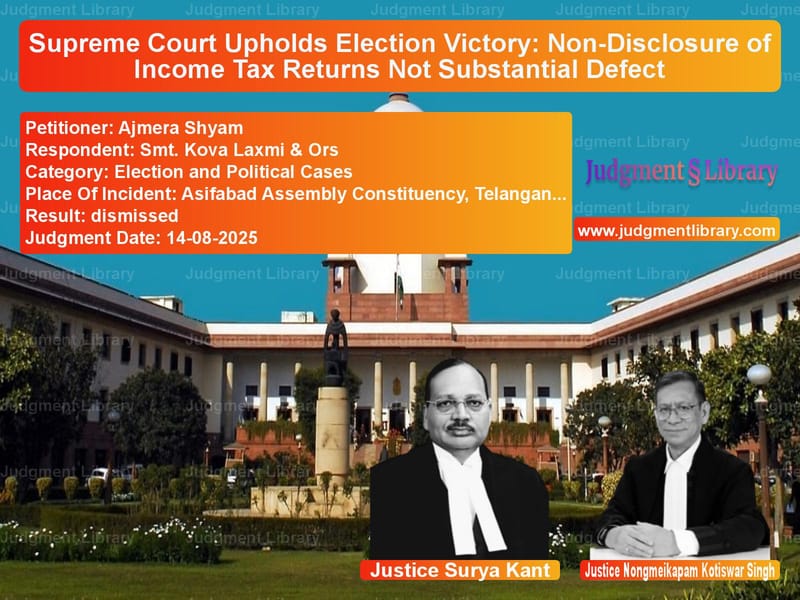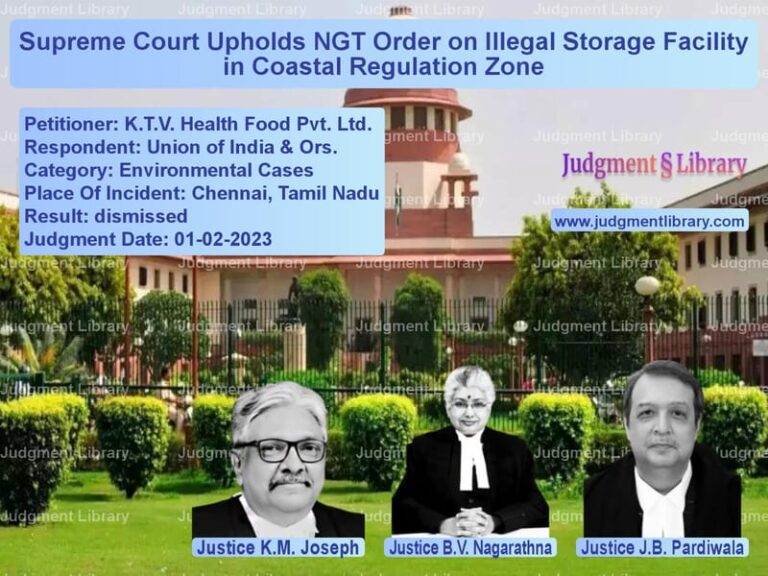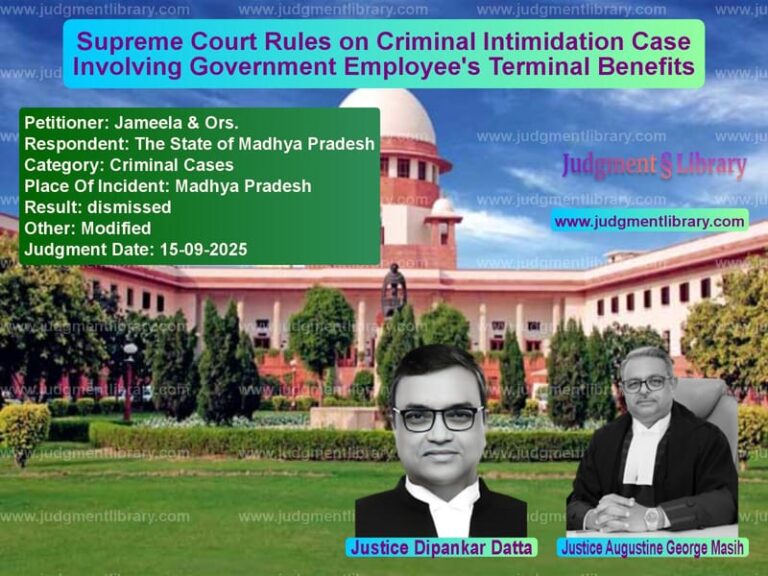Supreme Court Upholds Election Victory: Non-Disclosure of Income Tax Returns Not Substantial Defect
In a landmark judgment that balances electoral transparency with the sanctity of the people’s mandate, the Supreme Court of India recently delivered a verdict that has significant implications for election law and the disclosure requirements for political candidates. The case involved a challenge to the election of Smt. Kova Laxmi, who had won the Asifabad Assembly Constituency (ST) in Telangana, by her opponent Ajmera Shyam. The legal battle centered around whether the non-disclosure of income tax returns for four financial years in the election affidavit constituted a substantial defect that could invalidate an election victory.
The dispute emerged from the 2023 Telangana Legislative Assembly elections where Kova Laxmi, representing the Bharat Rashtra Samithi (BRS) party, secured 83,036 votes against Ajmera Shyam’s 60,238 votes, winning by a margin of 22,798 votes. Following her victory, Shyam filed an election petition challenging Laxmi’s election on the grounds that she had failed to disclose her income as shown in income tax returns for four financial years (2018-19 to 2021-22) in her Form 26 affidavit, instead showing them as ‘NIL’. The petitioner alleged that this non-disclosure amounted to improper acceptance of nomination, corrupt practice, and non-compliance with election laws.
The Legal Battle
The appellant, Ajmera Shyam, made several key arguments in his challenge. He contended that “the Respondent No.1, while submitting the Form 26 Affidavit, at the time of filing the nomination paper, did not disclose her income shown in the income tax returns for four completed financial years.” He specifically alleged that “Respondent No. 1 failed to disclose the income she was earning from her monthly honorarium of Rs. 1,00,000/- while serving as the Chairperson of Zila Parishad” and “the Ex-Legislator’s Pension received by her during the relevant financial years.”
In response, Kova Laxmi defended her position by arguing that she had disclosed all her assets, both immovable and movable, along with PAN details, occupation, and source of income. She maintained that “such non-disclosure did not constitute a material defect, as it was not of a substantial character” and emphasized that “since she had submitted her latest income tax returns for the financial year 2022-23 along with her PAN details, there was no deliberate suppression to mislead voters.” She also produced a ‘Non-drawal Certificate’ to prove she wasn’t receiving ex-MLA pension during the relevant period.
The Supreme Court’s Historical Analysis
The Supreme Court bench comprising Justices Surya Kant and Nongmeikapam Kotiswar Singh delved deep into the evolution of disclosure requirements in Indian election law. The Court traced the journey from the landmark Association for Democratic Reforms case, where the Delhi High Court first directed that voters have the right to know about candidates’ criminal antecedents, assets, and educational qualifications.
The Court extensively referenced the constitutional foundation of voters’ right to information, noting that “the right to get information in democracy is recognised all throughout and it is a natural right flowing from the concept of democracy.” The judgment emphasized that “voter’s speech or expression in case of election would include casting of votes, that is to say, voter speaks out or expresses by casting vote. For this purpose, information about the candidate to be selected is a must.”
However, the Court made a crucial distinction between different types of disclosures. While discussing the purpose of asset disclosure, the Court observed that “the real purposes of seeking information in regard to assets and liabilities are” primarily to evaluate whether elected representatives misuse their positions for self-aggrandizement. The Court clarified that “the purpose of disclosure of assets and liabilities of the candidate is not to associate with the prospect or eligibility of his candidature or his capacity to spend money in the electoral process.”
Balancing Technical Compliance with People’s Mandate
One of the most significant aspects of the judgment was the Court’s emphasis on balancing technical compliance with the sanctity of the people’s mandate. The Court observed that “in a democracy, the will of the people expressed through election is sacrosanct, which in Latin, is conveyed by the maxim, ‘Vox Populi, Vox Dei,’ signifying that the voice of the people and collective wisdom should be respected which can even be placed on the highest pedestal of divine authority.”
The Court cautioned against excessive judicial interference in electoral outcomes, stating that “minor procedural errors or purely technical objections of inconsequential nature thus, should not be allowed to override the mandate of the electorate.” The judgment emphasized that “courts must be careful not to become tools that undermine the popular mandate in the name of technical perfection.”
The Court further elaborated that “once the people have spoken their mind by casting their votes through the ballot box and reposed their confidence in the elected candidate, whenever the issue of invalidating the people’s mandate is raised before the court, the court must be very careful and circumspect.”
Application to the Present Case
In applying these principles to the case at hand, the Court made several key findings. The Court noted that while Kova Laxmi had not disclosed income tax returns for four years, she had “disclosed her assets, both movable and immovable, source of income, and profession, about which there is no real dispute.” The Court observed that “filing of an Income Tax Return is intrinsically related to and based on a person’s assets and sources of income” and since the assets themselves were disclosed, “non-disclosure of the tax return for certain financial years, although a technical defect under the rules, in our opinion cannot be considered to be a defect of significant importance.”
The Court made a crucial distinction, noting that “what has not been disclosed in the form of Income Tax Returns is certain information relating to assets and not ‘of assets’, as there was full disclosure of her assets and source of income.”
Another significant factor in the Court’s decision was the absence of objection during the scrutiny process. The Court noted that “the fact that the Appellant did not raise any objection when certain deficiencies which could be easily ascertained and detected is very significant” and that “failure to raise any objection at the time of scrutiny raises a question mark on the bona fide of the election petitioner.”
The Final Verdict and Its Implications
In its concluding remarks, the Court established an important test for future cases, stating that “the true test, in our opinion, would be whether the non-disclosure of information about assets in any case is of consequential or inconsequential import, finding of which will be the basis for declaring the election valid or void as the case may be.”
The Court dismissed the appeal, holding that “the non-disclosure of income in the income tax return for four financial years by Respondent No.1, is not a defect of substantial character” and therefore couldn’t invalidate the election. The Court clarified that “this disclosure requirement as far as assets and educational qualification is concerned, should not be unreasonably stretched to invalidate an otherwise validly declared election over minor technical non-compliances that are not of substantial character.”
This judgment represents a significant development in Indian election jurisprudence, establishing that not every technical non-compliance with disclosure requirements should lead to the overturning of election results. The Court has drawn a clear line between substantial defects that go to the root of electoral integrity and minor technical deficiencies that don’t affect the core of the electoral process. By emphasizing the importance of the people’s mandate while still upholding the principle of transparency, the Supreme Court has provided a balanced framework for future election disputes, ensuring that technicalities don’t override the democratic will of the people while maintaining necessary safeguards for electoral purity.
Petitioner Name: Ajmera Shyam.Respondent Name: Smt. Kova Laxmi & Ors.Judgment By: Justice Surya Kant, Justice Nongmeikapam Kotiswar Singh.Place Of Incident: Asifabad Assembly Constituency, Telangana.Judgment Date: 14-08-2025.Result: dismissed.
Don’t miss out on the full details! Download the complete judgment in PDF format below and gain valuable insights instantly!
Download Judgment: ajmera-shyam-vs-smt.-kova-laxmi-&-or-supreme-court-of-india-judgment-dated-14-08-2025.pdf
Directly Download Judgment: Directly download this Judgment
See all petitions in Judgment by Surya Kant
See all petitions in Judgment by N. Kotiswar Singh
See all petitions in dismissed
See all petitions in supreme court of India judgments August 2025
See all petitions in 2025 judgments
See all posts in Election and Political Cases Category
See all allowed petitions in Election and Political Cases Category
See all Dismissed petitions in Election and Political Cases Category
See all partially allowed petitions in Election and Political Cases Category







